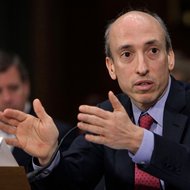 Yuri Gripas/ReutersGary Gensler, the Commodity Futures Trading Commission chairman, testified last week before the Senate Agriculture Committee.
Yuri Gripas/ReutersGary Gensler, the Commodity Futures Trading Commission chairman, testified last week before the Senate Agriculture Committee.
8:04 p.m. | Updated
Federal regulators approved tougher constraints on Wall Street risk-taking on Monday, adopting the MF Global rule, named after the collapsed brokerage firm that is believed to have improperly used millions of dollars of customer money.
The new rule will limit how the brokerage industry can invest customer money, largely barring firms from using client funds to buy foreign sovereign debt. It also prevents a complex transaction that allowed MF Global, in essence, to borrow money from its own customers.
The Commodity Futures Trading Commission, which voted unanimously to approve the rule, planned to finish it months ago.
But the agency delayed action as a result of strong opposition from Jon S. Corzine, who at the time was chief executive of MF Global. Mr. Corzine resigned on Nov. 4, four days after MF Global filed for bankruptcy protection.
“I believe that this rule is critical for the safeguarding of customer money,” Gary Gensler, the agency chairman, said Monday.
The revelation that client money was missing at MF Global has incited panic in the futures industry. MF Global’s customers, including farmers and hedge funds, are still owed millions of dollars.
Now, some customers say they are losing faith in a system that promised to protect their money. While brokerage firms can invest client money, such funds must never be commingled with company funds. MF Global violated that principle in its final chaotic days, tapping its segregated client accounts to meet its own financial obligations, people briefed on the matter have said.
The missing money, thought to be about $1.2 billion, has prompted several federal investigations in recent weeks. The futures commission is leading the hunt for the money, while the Federal Bureau of Investigation is examining possible wrongdoing.
Some regulators are also examining a flood of new rules for brokerage firms, part of an effort to prevent a repeat of the MF Global debacle. MF Global’s collapse has also led to renewed calls for federal regulators to keep a closer watch on brokerage firms, reclaiming oversight authority now delegated to for-profit exchanges like the CME Group.
Bart Chilton, a Democratic member of the commodities commission, is pushing for Congress to create an insurance fund for futures industry customers.
The rule adopted by the commission on Monday is aimed at the industry’s use of customer money. While firms can invest customer funds in United States Treasury securities and other plain-vanilla funds, the agency reined in riskier bets.
Until now, brokerage firms could invest client money in a number of securities, including sovereign debt. Under the new rule, if firms want to invest customer funds in foreign government bonds, they must petition the agency for an exemption. The new rule also bars firms from using client money so that one arm of the company can lend to another, a transaction known as an in-house repurchase agreement.
“As recent events have highlighted, the protection and preservation of customer funds is fundamental to our markets,” Scott O’Malia, a Republican member of the commission, said in a statement.
Article source: http://feeds.nytimes.com/click.phdo?i=9d57d7b171ea1bae8f184f13b16cfc73
